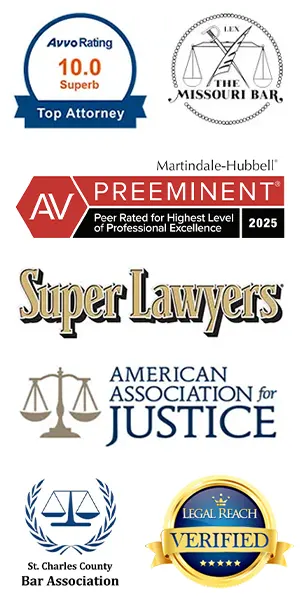Experienced Trial Lawyers
More Than 100 Years Of Combined Experience On Your Side

Compensatory Damages in Missouri Car Accident Lawsuits

Understanding Compensatory Damages
In personal injury cases, there are two broad types of remedies for victims: compensatory and punitive damages. Compensatory damages are designed to make the injured party “whole” again by providing financial compensation for losses incurred due to the accident.
While compensatory damages reimburse the victim for their losses, punitive damages are designed to penalize the wrongdoer for egregious behavior and to discourage similar actions in the future. Punitive damages are rarely awarded – only in cases where the defendant’s conduct was especially reckless, malicious, or criminal in nature.
In Missouri, compensatory damages fall into two main categories: economic and non-economic damages.
Economic Damages
Economic damages, also called special damages, cover the quantifiable financial losses that result from the accident. These include:
- Medical expenses: These are costs related to treating injuries from the accident, including:
- Emergency room visits
- Hospital stays
- Surgeries
- Medications
- Physical therapy
- Rehabilitation
- Future medical care for ongoing issues.
- Lost wages: The victim may be compensated for income lost due to time away from work while recovering from injuries. This can include:
- Missed paychecks
- Lost bonuses or commissions
- Reduced earning capacity if injuries prevent returning to the same job.
- Property damage: This covers costs associated with repairing or replacing damaged property, primarily the victim’s vehicle.
- Out-of-pocket expenses: This is compensation for any other expenses from the accident, like:
- Transportation to medical appointments
- Home modifications to accommodate injuries
- Hiring help for household tasks during recovery.
Non-Economic Damages
Non-economic damages are also referred to as general damages because they cover intangible losses and are more subjective. These may include:
- Pain and suffering: Compensation for physical pain and discomfort experienced due to injuries
- Emotional distress: Damages for psychological trauma, anxiety, depression, or other mental health issues resulting from the accident
- Loss of enjoyment of life: Compensation for the inability to participate in hobbies, activities, or experiences that the victim enjoyed before the accident
- Loss of consortium: Damages awarded to the spouse of an injured party for the loss of companionship, affection, or intimacy.
To receive compensatory damages, the plaintiff’s attorney must demonstrate that the defendant’s negligence directly caused the plaintiff’s losses. This requires presenting compelling evidence to the court or jury. The goal is to ensure that the injured party receives fair compensation for all damages incurred – both economic and non-economic – as a result of the incident.
The Role of Insurance in Compensatory Damages
In most car accident cases, the primary source of compensation is the at-fault driver’s auto insurance policy. Missouri law requires all drivers to carry minimum liability coverage of:
- $25,000 per person for bodily injury
- $50,000 per accident for bodily injury
- $25,000 per accident for property damage.
If the at-fault driver’s insurance coverage is insufficient to cover all damages, the injured party may need to pursue additional avenues for compensation, such as:
- Their own underinsured motorist coverage
- A personal injury lawsuit against the at-fault driver
- Claims against other potentially liable parties (such as negligent vehicle manufacturers or government entities responsible for road maintenance).
Proving Damages in a Missouri Car Accident Lawsuit
To recover compensatory damages in a Missouri car accident lawsuit, the plaintiff (injured party) must prove these four elements:
- The defendant owed a duty of care to the plaintiff.
- The defendant breached that duty.
- The breach caused the plaintiff’s injuries.
- The plaintiff suffered actual damages as a result.
Evidence used to prove damages may include:
- Medical records and bills
- Expert testimony from doctors or economists
- Pay stubs or tax returns to demonstrate lost wages
- Photographs of injuries or property damage
- Testimony from friends and family about the impact of injuries on daily life.
The Importance of Proper Documentation in Seeking Compensatory Damages
Accurately documenting all losses is crucial for maximizing compensatory damages in a car accident lawsuit. Victims should:
- Keep detailed records of all medical treatments and expenses.
- Document time missed from work.
- Save receipts for any out-of-pocket expenses related to the accident.
- Keep a journal detailing pain levels, emotional state, and limitations on daily activities.
The Statute of Limitations for Missouri Car Accidents
In Missouri, the statute of limitations or time limit for filing an auto accident lawsuit is five years from the date of the crash. Failing to file within this timeframe can result in the loss of the right to seek compensation.
This five-year period is longer than in many other states, giving victims more time to assess their damages, seek medical treatment, and consult with an attorney. However, it’s generally advisable to begin the legal process as soon as possible after an accident for several reasons:
- Evidence can deteriorate or disappear over time.
- Witnesses’ memories may fade.
- It’s easier to document the full extent of injuries and damages closer to the time of the accident.
- There may be shorter deadlines for filing insurance claims.
It’s also important to note that if the accident resulted in a fatality and you’re considering a wrongful death lawsuit, the statute of limitations is three years from the date of death.
If you fail to file your lawsuit within the applicable statute of limitations, you will likely lose your right to seek compensation through the court system. Therefore, it’s crucial to consult with an attorney as soon as possible to ensure your rights are protected and all necessary actions are taken within the required timeframes.
When Legal Representation Becomes Necessary
Navigating the complexities of compensatory damages in Missouri car accident lawsuits can be challenging. An experienced personal injury attorney can:
- Accurately assess the full value of your claim
- Gather and present compelling evidence to support your case
- Negotiate with insurance companies on your behalf
- Represent you in court if a fair settlement cannot be reached.
We at Shea Kohl Law have extensive experience handling car accident cases in Missouri. Our skilled attorneys understand the nuances of state law and can work tirelessly to help you receive the full compensation you deserve.
FAQ: Compensatory Damages in Missouri Car Accident Lawsuits
How does Missouri’s pure comparative fault rule affect compensatory damages in car accident cases?
Missouri’s pure comparative fault rule plays a significant role in determining the amount of compensatory damages a plaintiff can recover in a car accident lawsuit. According to this law, a plaintiff is still entitled to damages even if they had some responsibility for the disaster, but it reduces the amount of compensation based on their percentage of fault.
Under this system, the jury or judge will determine the total amount of damages and then examine the percentage of fault that each party contributed to the accident. The plaintiff’s recovery is then reduced by their percentage of fault.
For example, if a jury determines that the total damages in a case are $100,000, but also finds that the plaintiff was 30% at fault for the accident, the plaintiff would be entitled to recover $70,000 (70% of the total damages).
Missouri’s “pure” comparative fault rule allows plaintiffs to recover damages even if they are found to be more than 50% at fault for the accident. This differs from “modified” comparative fault states, where plaintiffs are barred from recovery if they are found to be 50% or more at fault.
This rule underscores the importance of having strong legal representation to minimize any assignment of fault to the plaintiff and maximize the potential recovery.
Are there any caps on compensatory damages in Missouri car accident lawsuits?
Unlike some states, Missouri does not impose caps on most compensatory damages in car accident cases. This means there is no upper limit on the amount of economic or non-economic damages that can be awarded in a car accident lawsuit.
For economic damages, this allows plaintiffs to recover the full amount of their quantifiable losses, regardless of how high they may be. This is particularly important in cases involving severe injuries that result in substantial medical expenses or long-term loss of income.
Similarly, there is no cap on non-economic damages such as pain and suffering, emotional distress, or loss of enjoyment of life. This allows juries to award damages that they believe fairly compensate the victim for these intangible losses, without being constrained by an arbitrary limit.
However, there is a cap on punitive damages in Missouri. Punitive damages, which are separate from compensatory damages, are capped at $500,000 or five times the amount of the judgment, whichever is greater.
How are non-economic damages calculated in Missouri car accident cases?
Calculating non-economic damages in Missouri car accident cases can be complex as these damages don’t have a specific dollar value attached to them. Unlike economic damages, which can be calculated based on bills and receipts, non-economic damages require a more subjective approach.
In Missouri, there’s no set formula for calculating non-economic damages. Instead, various factors are considered, including:
- The severity and permanence of the injuries
- The impact of the injuries on the victim’s daily life
- The victim’s age and overall health before the accident
- The amount of pain and suffering experienced
- Any emotional or psychological effects of the accident
- The impact on the victim’s relationships and quality of life.
Attorneys and insurance companies often use one of two methods to estimate non-economic damages:
- The multiplier method: This involves multiplying the total economic damages by a number (typically between 1.5 and 5) based on the severity of the injuries and impact on the victim’s life.
- The per-diem method: This assigns a daily rate to the victim’s pain and suffering and multiplies it by the number of days the victim experienced (or is expected to experience) this pain and suffering.
Ultimately, if the case goes to trial, it’s up to the jury to determine what they believe is fair compensation for these non-economic losses. This is why it’s crucial to have an experienced attorney who can effectively present evidence of these intangible losses, including testimony from the victim, their family, and potentially expert witnesses.
Note that while there’s no cap on non-economic damages in Missouri car accident cases, the amount awarded must be reasonable and supported by the evidence presented. An experienced attorney can help ensure that all aspects of your non-economic damages are thoroughly documented and persuasively presented to maximize your potential recovery.
Injured in a Missouri Car Collision? The Experienced Shea Kohl Law Can Help You Get Compensation.
Compensatory damages are crucial if you’ve been in an auto accident and need financial recovery. However, the process of claiming fair compensation can be complex as you face layered rules, insurer tactics, and potential disputes. You need a skilled and compassionate personal injury attorney who can guide you through the process and advocate for your maximum compensation.
If you’ve been injured in a car accident in Missouri, don’t hesitate to reach out to us at Shea Kohl Law. Call us at (636) 946-9999 for a free consultation on your case.
Call SK Law at (636) 946-9999
or contact us online to schedule your initial consultation.
Use of this Website does not create an attorney-client relationship. The choice of a lawyer is an important decision and should not be based solely upon advertisements. Any and all pictorial representations, people and or situations contained on this page or any other page in this website are simulations for purposes of advertising and for this site and are not actual clients or situations.
SK Law serves clients in Missouri including St. Charles, Troy and Lincoln and throughout Warren and St. Louis counties. We also serve clients in Illinois.


